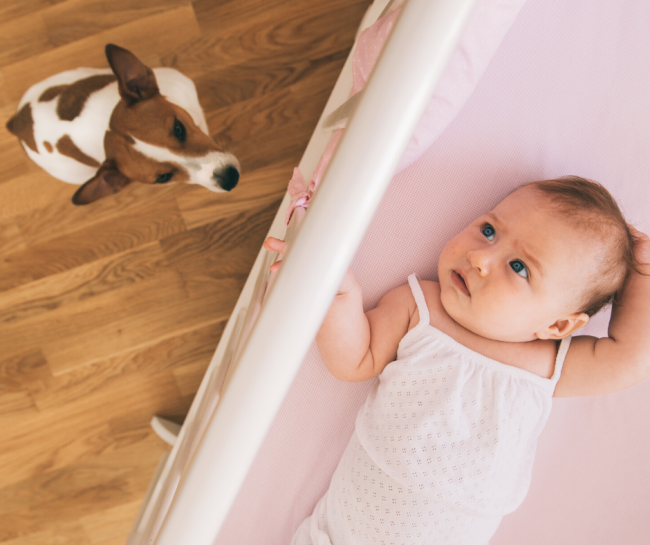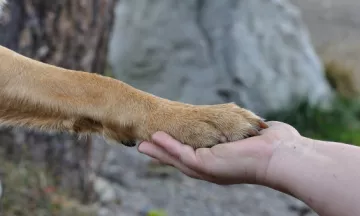How to properly introduce dog to a baby
When introducing your dog to a baby, it is important to have a plan in place. This ensures the safety of the baby and also sets your dog up for success. When you first arrive home with a newborn baby, ensure you greet your dog first and then place them in a crate or another room before bringing the baby in. Don't make a big event and purposely invite your dog to meet the baby.

Despite the photos you may see online, resist the urge to let your dog approach the baby's space and crowd them. Or suddenly rushing your dog out of the space every time the baby enters or cries. Instead, teach your dog to respect the baby's space. As much as you can, try and continue your routine and allow your baby and dog to co-exist without having to interact at the beginning. This allows your dog to slowly acclimatise to the baby's presence, smells and sounds. If you have properly practised and planned for your baby's arrival, the whole process should be a smooth experience. Here are some things you can do to prepare your dog for the arrival of a new baby.
Expectations and management
A new baby is an exciting time for the whole family. It also means lots of new and unexpected changes to your everyday routine. It's a good idea to predict any routine changes and make note of them. That way, you are able to slowly ease your dog into those new routines and expectations or put management plans in place.
For example, your dog may be used to three long walks a day but you know when the baby arrives, you'll realistically only be able to do shorter walks. Use the time before the baby arrives to slowly reduce your dog's walking times and add in other forms of enrichment so that they can start getting used to it. Or practise hiring a dog walker to take your dog for longer walks.

Crate training: teaching your dog to settle
Crate training is a good life skill for any dog. The crate gives your dog a safe space and teaches them to settle on cue. This also gives you a positive way to manage introducing your dog to the baby. For more information and details on how to crate train your dog, refer to our crate training blog post.
Increase enrichment
Prepare and try various enrichment activities with your dog now so that they can get used to entertaining themselves. If your dog is used to bring involved in everything you do, providing them with enrichment activities teaches them independence. When the baby arrives, you're likely not going to be able to involve your dog in as many activities. Realistically, there may be days when you won't have time to get out of the house. Therefore learning to prepare enrichment activities and encouraging independence is a good habit to develop.
Address dog behavioural issues now
If there are any dog behaviours that is vaguely inconvenient or annoys you, take the time to address them now. Dedicate time for training sessions, consult with a dog trainer or hire a pet sitter who also offers dog training to help if needed. While it may seem like a small inconvenience now, the arrival of the baby may cause additional stress and can easily magnify the behavioural issue.
For example, imagine if your dog enjoys barking at every person that comes to the door. He may listen when you ask him to quiet down and you can accept that for now. However, if you have just put the baby down for a nap and the barking wakes the baby, you're going to be less forgiving about the barking.
Practise to prepare for introducing your dog to the baby
Aside from planning and managing expectations, it is also important to practise the various scenarios that will take place once the baby arrives. This includes smells, noises, new boundaries and routines. Gradually incorporating all these things will help when you introduce your dog to the baby.
Your new dog and baby routine
Start incorporating any changes to your routine that will affect your dog before introducing your dog to the baby. For example, if there are going to be areas in the home the dog can no longer go, practise it when you have the proper time to do so rather than during the confusing first few weeks when you're also trying to adjust to parenthood. It will be much easier for you and less stressful for your dog.

It's also a good idea to get your dog used to walking on a loose leash next to you and a pram. Read all about how to train your dog to walk on a loose leash here. Remember, your patience won't always be as good as it should be while you're adjusting to parenthood. This may affect how well you can train and prepare your dog to its new expectations. Therefore, slowly introducing your dog to new routines means that you are less likely to see behavioural problems develop as a result of the baby's arrival.
Supervising your dog and baby
Even when you been successful in introducing your dog to the baby, ensure that you have the means to keep your baby and dogs apart so that you NEVER leave them together unsupervised. Either your dog or having a separate playpen for your baby. No matter how much you trust your dog, accidents can happen in a split second. Therefore, it's always best to remain vigilant until you are able to teach them how to appropriately interact with one another.

Introducing dog to baby smells and noises
Download a sound effects app and get your dog used to the sound of a baby crying, squealing or laughing. Organise for your partner or family member to bring home a swaddle from the hospital before the baby comes home. Use that to start teaching your dog to respect the space of that smell.
Have a pet care back up plan
The first few weeks of bringing a baby home can be a chaotic time no matter how well you have planned. So don't forget to have a backup plan for your pets. Organise with your family or book a pet sitter. Have them come over to spend time with your pet so they don't feel neglected. Or if you feel like you need more time or space to settle into a routine, consider booking your dog for doggy day care or into overnight boarding with a pet sitter.
Remember to continue to manage and set your dog up for success. Don't rush interactions too early or force your dog to be around the baby if they don't want to be. Some dogs may simply find the noise and smells too overwhelming and may need extra time to adjust. Be patient and take it easy on yourself, your baby and your dog during this time. Doing so will ensure everyone continues to have wonderful relationship.






